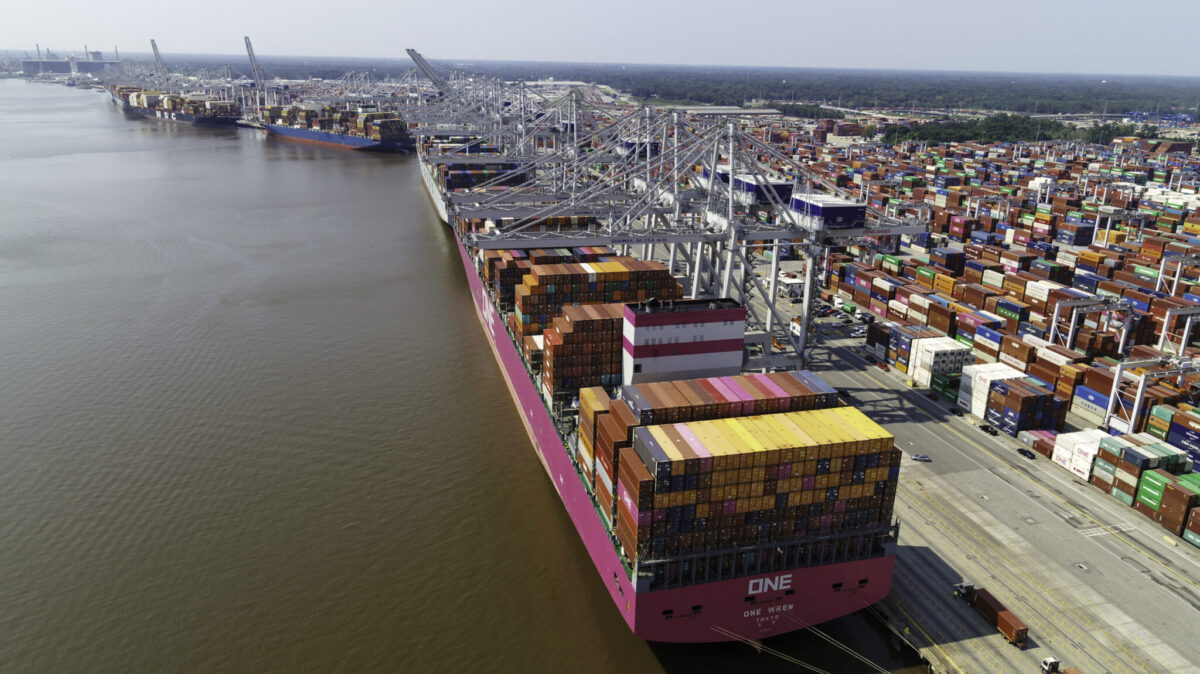
This post was updated at 5:30 p.m. on Nov. 9 to add comments from Georgia officials.
(GA Recorder) — The White House announcement that the Port of Savannah will soon be able to spend $8 million to help unclog a sluggish supply chain won bipartisan celebration Tuesday from Georgia’s congressional delegation.
Savannah appears to be the first seaport in line to improve its facilities following Friday’s passage of the $1.2 trillion infrastructure bill.
It passed without the support of any Georgia Republicans. But GOP Rep. Buddy Carter, who represents a coastal district that includes the port, applauded the investment just the same.
“This is an important first step towards addressing congestion affecting Savannah,” Carter said in a statement. “I applaud the Georgia Ports Authority for their creativity in proposing this solution and hope it will serve as a model for ports across the country.”
The millions will be used to convert existing inland facilities into five pop-up container yards in both Georgia and North Carolina, which will help address supply chain challenges the nation is experiencing.
Georgia Sen. Raphael Warnock said he has urged senior officials at the U.S. Department of Transportation and the White House, as well as the Georgia Ports Authority and their officials at the Port of Savannah, to press the essential need for federal funding to ease supply chain issues at Georgia’s ports.
“Since I got to Washington I’ve been working to make sure the federal government is doing what’s needed to strengthen Georgia’s infrastructure and address supply chains issues impacting consumers and businesses across our state,” Warnock said in a statement. “I’ve been urging the administration to act boldly to combat these supply chain disruptions, so I’m thrilled they listened to me and others on the ground in releasing federal investments for the Port of Savannah that will help facilitate the transport of cargo, ease port congestion and keep our economy strong and moving forward.”
President Joe Biden has yet to sign the bill, which Congress sent to Biden’s desk late last week to fund improvements in highways, transit, ports, waterways, airports and other infrastructure. But seaports facing historic backups from the pandemic are already making plans to put the money and policy changes to use.
Port operators are planning to start many programs within 45 to 90 days through a variety of funding streams and policies the bill will provide.
The administration expects the Port of Savannah, the nation’s third-busiest importer, to be the first to take advantage of a policy change allowing ports to redirect about $8 million in funding to immediately address supply chain challenges.
The Port of Savannah will use that power to convert existing facilities to the temporary container yards, freeing up space closer to the port itself. Those facilities could be ready in as few as 30 days.
The head of the Georgia Ports Authority said the money should go a long way toward getting cargo unloaded from ships waiting to make landfall. Monday, 18 container ships anchored off the port while waiting for cranes to offload cargo.
“Commerce relies upon infrastructure and innovation to succeed,” said ports authority Executive Director Griff Lynch. “Every part of the freight and logistics sector is reassessing its operations due to the current crisis. This reassigned funding will allow us to open new intermodal outlets to help alleviate supply chain congestion and improve the flow of goods for our customers at the Port of Savannah.”
Biden is scheduled to appear at the Port of Baltimore in Maryland Wednesday to further promote the bill’s effects on shipping infrastructure. The pandemic has caused backups at seaports around the world, leading to major supply chain delays in the United States.
The administration will also make available $230 million in grants to ports and $13 million to improve navigable waterways within 45 days. An additional $475 million for ports and navigable waterways would be available in 90 days.
In the next three months, the administration will identify $3.4 billion in upgrades to inspection facilities at ports of entry handling international trade. Outdated customs inspection infrastructure “has clearly been a bottleneck.”
In addition to the relatively short-term funding, the administration announced plans to help the long-term flow of goods from ports. The bill will provide $110 billion for roads and bridges that the White House said could be “smartly deployed” to ease supply chain congestion.
The Transportation Department and the National Maritime Commission will request proposals to standardize data collection and sharing in the transportation supply chain. Private companies are responsible for most goods movement throughout the country, and don’t have a universal system for collecting and sharing data.
The White House said standardizing data would allow different companies to work together and create “greater transparency, resiliency, fluidity, competition, and efficiency across the supply chain.”
Georgia Recorder Editor-in-Chief John McCosh contributed to this report.







